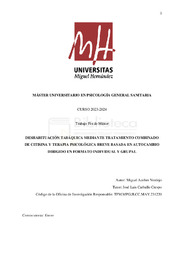Por favor, use este identificador para citar o enlazar este ítem:
https://hdl.handle.net/11000/33567Registro completo de metadatos
| Campo DC | Valor | Lengua/Idioma |
|---|---|---|
| dc.contributor.advisor | Carballo, José Luis | - |
| dc.contributor.author | Acebes Verdejo, Miguel | - |
| dc.contributor.other | Departamentos de la UMH::Psicología de la Salud | es_ES |
| dc.date.accessioned | 2024-10-18T12:50:52Z | - |
| dc.date.available | 2024-10-18T12:50:52Z | - |
| dc.date.created | 2024-01 | - |
| dc.identifier.uri | https://hdl.handle.net/11000/33567 | - |
| dc.description.abstract | La Organización Mundial de la Salud (OMS) reporta que el tabaco causa más de 8 millones de muertes anuales. A pesar de una disminución en el consumo en España, sigue siendo preocupante. Diversas ramas de la salud han desarrollado tratamientos para dejar de fumar. Entre los farmacológicos, actualmente se prescribe Citisina. Desde la psicología, se aplican entre otros programas de intervención breve, destacando el Programa de Autocambio Dirigido (ACD) en formato individual o grupal. Los tratamientos combinados (psicológicos y farmacológicos) muestran tasas de éxito mayores. El objetivo del estudio es evaluar la efectividad de un programa que combine ACD con Citisina, y comparar los resultados entre tratamientos individuales y grupales. Se estudió la efectividad del tratamiento sobre dos pacientes uno formando parte de un grupo y otro de manera individual. Se encontraron aspectos positivos como la reducción notable en el número de cigarrillos o el aumento de la motivación de ambos pacientes. Entre los aspectos negativos, la no participación de los pacientes en el total de las sesiones o la no realización de los pacientes de los ejercicios para casa. | es_ES |
| dc.description.abstract | The World Health Organization (WHO) reports that tobacco causes more than 8 million deaths annually. Despite a decrease in consumption in Spain, it remains a cause for concern. Various branches of healthcare have developed treatments to quit smoking. Among pharmacological approaches, Cytisine is currently prescribed. From a psychological perspective, various interventions, including the Autodirected Change Program (ACD) in individual or group format, have been implemented. Combined treatments (psychological and pharmacological) show higher success rates. The objective of the study is to evaluate the effectiveness of a program that combines ACD with Cytisine and compare the results between individual and group treatments. The effectiveness of the treatment was studied on two patients, one participating in a group and the other individually. Positive aspects were found, such as a notable reduction in the number of cigarettes and an increase in motivation for both patients. Among the negative aspects were the non-participation of patients in all sessions or the failure of patients to complete home exercises. | es_ES |
| dc.format | application/pdf | es_ES |
| dc.format.extent | 36 | es_ES |
| dc.language.iso | spa | es_ES |
| dc.publisher | Universidad Miguel Hérnández de Elche | es_ES |
| dc.rights | info:eu-repo/semantics/openAccess | es_ES |
| dc.rights | Attribution-NonCommercial-NoDerivatives 4.0 Internacional | * |
| dc.rights.uri | http://creativecommons.org/licenses/by-nc-nd/4.0/ | * |
| dc.subject | Cesación tabáquica | es_ES |
| dc.subject | ACD | es_ES |
| dc.subject | Citisina | es_ES |
| dc.subject | Terapia Grupal | es_ES |
| dc.subject | Terapia Individual | es_ES |
| dc.subject.other | CDU::1 - Filosofía y psicología::159.9 - Psicología | es_ES |
| dc.title | Deshabituación tabáquica mediante tratamiento combinado de citisina y terapia psicológica breve basada en autocambio dirigido en formato individual y grupal | es_ES |
| dc.type | info:eu-repo/semantics/masterThesis | es_ES |

Ver/Abrir:
ACEBES VERDEJO TFM.pdf
870,99 kB
Adobe PDF
Compartir:
 La licencia se describe como: Atribución-NonComercial-NoDerivada 4.0 Internacional.
La licencia se describe como: Atribución-NonComercial-NoDerivada 4.0 Internacional.
.png)